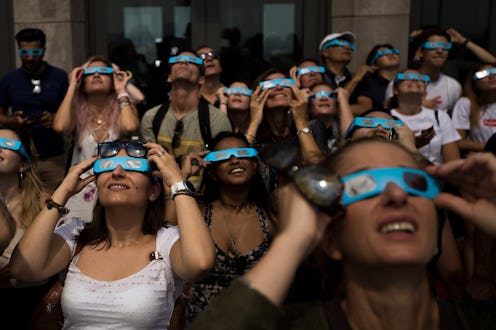Life
These Are The Symptoms Of Solar Eclipse Eye Damage You Should Watch Out For

As you know, the solar eclipse happened on August 21, which millions upon millions of people witnessed. However, what if you stared right at the sun and didn't wear protective glasses? If that's the case, there are symptoms of solar eclipse eye damage to look for, because you want to make sure the short, rare event doesn't cost you a long lifetime of eye damage.
"The most concerning injury surrounding watching an eclipse improperly is injury to the retina, the delicate inner layer of the eye wall," Dr. Tony Huynh, an ophthalmology specialist with Pacific Medical Centers, told The News Tribune. "If this part of the eye becomes damaged, a person can suffer from blurred vision, decreased color vision, blind spots (typically in the central vision), distorted vision, and headaches." A solar eclipse can even cause blindness.
In fact, Lou Tomososki and Roger Duvall had experience with looking directly at the sun during a partial eclipse. Back in 1962, they watched one in Bend, Oregon. They each looked at the sun with one eye for about 20 seconds, and that was 20 seconds too long. Those fleeting, temporary 20 seconds ended up causing permanent damage to their eyes. The men developed solar retinopathy from overexposure to UV rays.
“Looking at the sun can cause solar retinopathy, which occurs when bright light from the sun floods the retina,” Dr. Janelle Routhier, Senior Director of Customer Development at Essilor, tells Bustle. “It is caused by staring at the sun for too long. Most people can’t stand to look at the sun long enough to cause damage, but the eclipse (partial or total) makes it more comfortable to stare for a longer period of time. This condition can also be referred to as ‘eclipse blindness,’ and its effects can be permanent.”
Scary, right? Now that today’s eclipse is over, below are symptoms of solar eclipse eye damage you should watch out for in the coming hours, weeks, and months.
1. Eye Pain
When your skin gets sunburned, you notice it almost immediately. Well, if you watched the solar eclipse without eclipse glasses or protective eyewear, you can suffer eye damage and your cornea can become sunburned, too. The condition is called solar keratitis, and a key symptom is eye pain, usually within 24 hours after sun exposure. “If you are experiencing any pain, I recommend you visit your local eyecare professional to be sure your eyes are taken care of,” says Dr. Routhier.
2. Light Sensitivity
PreventBlindness.org states that your eyes may become sensitive to light if you viewed an eclipse straight on. You can experience the aforementioned solar retinopathy, i.e., “eclipse blindness”/retinal burns. “This exposure to the light can cause damage or even destroy cells in the retina (the back of the eye) that transmit what you see to the brain,” said PreventBlindness.org. “This damage can be temporary or permanent and occurs with no pain. It can take a few hours to a few days after viewing the solar eclipse to realize the damage that has occurred.”
Dr. Routhier agrees. “When your eyes are over-stimulated by sunlight, they release a flood of communication chemicals that can damage the retina,” she says. “This damage is often painless, as you don’t have pain receptors in that tissue, so people don't realize they’re damaging their vision.”
3. Blurred Vision
If you looked at the eclipse without protecting your eyes, you may not feel or see the effects until the next day, Ralph Chou, professor emeritus at the School of Optometry & Vision Science at the University of Waterloo in Canada, told Space.com. Your eyes’ cells can start to lose their function while you sleep, he said. The next morning, you may have impaired vision, i.e., blurred vision. The center of vision is affected the worst, the retina responsible for seeing in high resolution and in color. "Most people, they don't see a black spot," Chou said. "For the most part they have damaged photoreceptors that just aren't capable of doing more than just registering maybe the presence of light but can't really build up enough information for them to be able to see clearly."
4. Loss Of Vision In One Or Both Eyes
According to PreventBlindness.org, you may lose vision in one or both eyes if you watched the eclipse without protecting them. So, as the hours, days, and weeks go on, be vigilant of any changes to your eyesight. If you’re wondering if eclipse blindness is curable, good question. "You just sort of end up having to wait it out, and that's the really unfortunate part about it," Chou said. "The typical person who's been injured is going to wait six to 12 months before they know what their ultimate status is going to be." He added that half of people who are diagnosed with eclipse blindness will recover — have full vision — in six months. However, the other half partially recover or do not recover.
When In Doubt, Go Get Checked Out
“You may not immediately see the damage that is caused to your eyes either — but UV radiation can damage the outside structure of your eye,” says Dr. Routhier. “Brightness and intensity of light damages the focal point of your eye, which sometimes can be reversed, but many times is permanent. Your eye doctor can identify the signs of sun damage by examining your eye.”
As Dr. Routhier says, seeing an eye doctor is best in order to assess any eye damage, and particularly if you’re experiencing any of the above symptoms. Meanwhile, the next solar eclipse will be in 2024, so better safe than sorry.